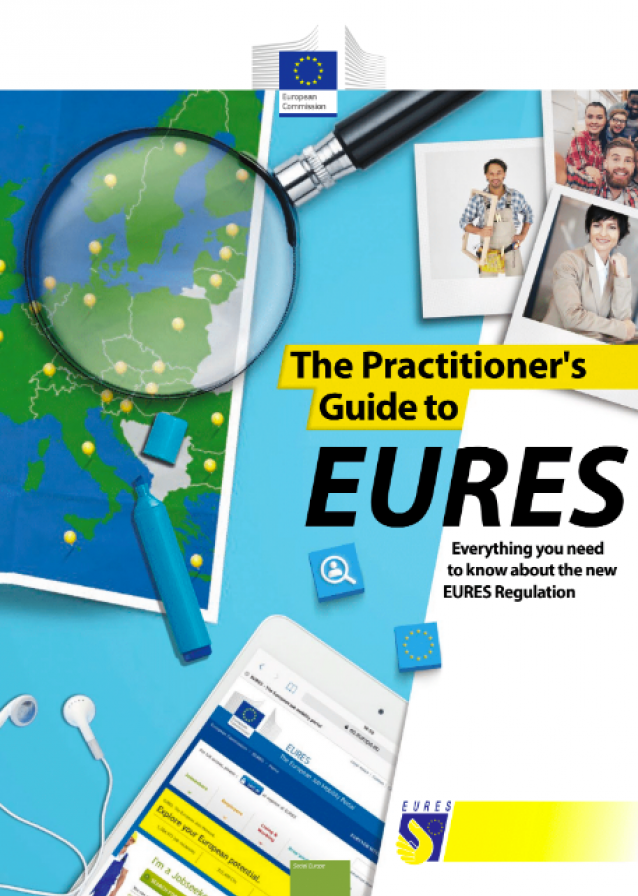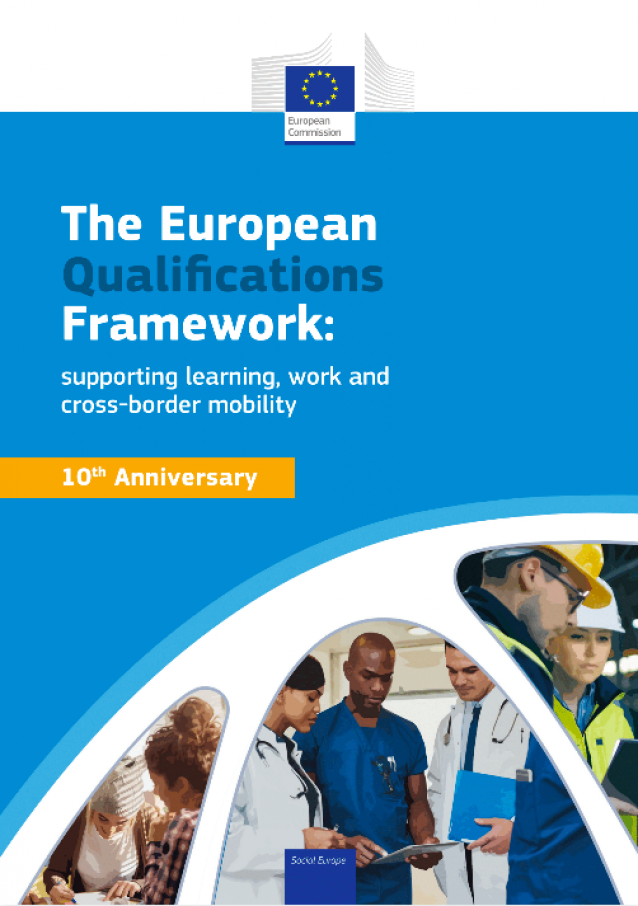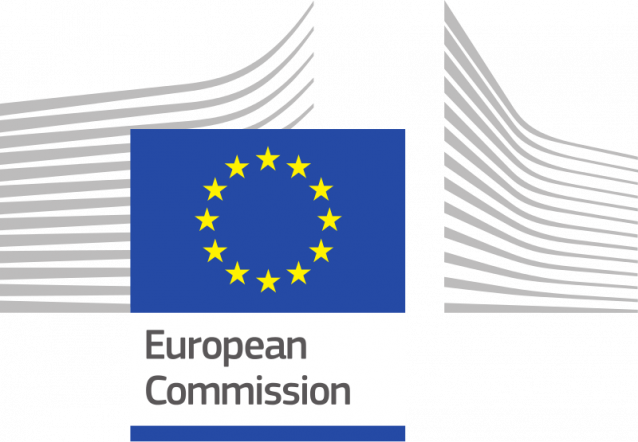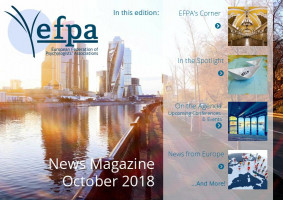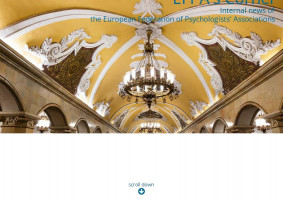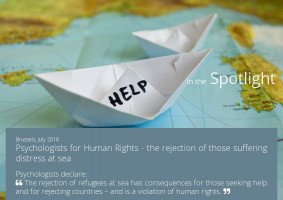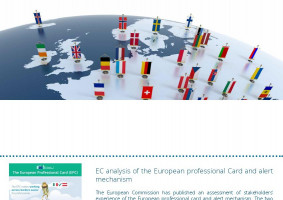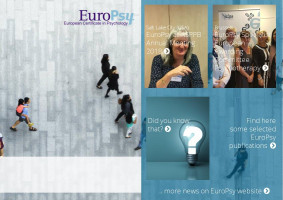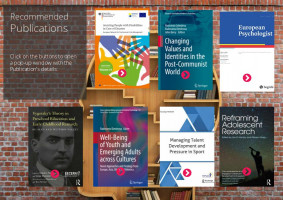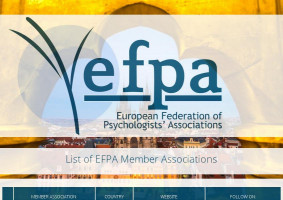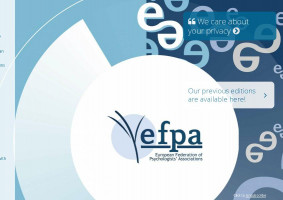
EC analysis of the European professional Card and alert mechanism
The European Commission has published an assessment of stakeholders’ experience of the European professional card and alert mechanism. The two tools were introduced in January 2016 as part of the revised Directive on the mutual recognition of professional qualifications. The European professional card (EPC) is a way for professionals to have their qualifications recognised in another EU country. The system is currently available for the following five professions: mountain guides, pharmacists, physiotherapists, nurses responsible for general care and real estate agents. >>
>> To ensure that EU patients are adequately protected, an alert mechanism was also introduced in parallel with the EPC. EU member states are required to use this mechanism to quickly warn each other about rogue professionals. Both tools work via the Internal Market Information system (IMI), an IT application used to connect public authorities across the EU.
The staff working document, published in April 2018, builds on feedback the Commission received in several expert meetings, through a conference, a workshop, bilateral exchanges with member states authorities, as well as a public survey.
The survey received 181 responses from public authorities and professional organisations. The results were analysed and included in the staff working document, 'Assessment of stakeholders' experience with the European Professional Card and the Alert Mechanism procedures' ( PDF, 1006 KB) of April 2018. These results will contribute to the further improvement of the functioning of the EPC and the Alert Mechanism to continuously address users' needs. >>
According to the report, a total of 3,997 EPC applications were submitted during the period between 18 January 2016 and 30 November 2017. The EPC statistics show that physiotherapists were the most active in the period - they represent 38% of all applications with 1,529 applications.
Physiotherapists were followed by nurses responsible for general care with a share of 26% (1,037) of the total applications. They were followed by mountain guides (23%, 903 applications), pharmacists (10%, 396 applications), and real estate agents (3%, 132 applications). A total of 13,597 alerts were sent by the member state authorities in the period between the introduction of the alert mechanism on 18 January 2016 and 30 November 2017. The vast majority of the alerts were for cases where a professional was restricted or prohibited from practice. Only five alerts were for the use of falsified diplomas.
The EC has stated that statistical analysis and stakeholder feedback have also confirmed that the IMI system is the right platform for these initiatives and the report underlines the importance of continuous fine-tuning of the platform’s functionalities. A number of improvements have been made to improve the system for both the EPC and alert mechanism throughout the implementation period.
The report does not make any proposals to extend the European professional card to other professions and the EC intends to improve the existing legal and technical guidance to ensure that the two tools can respond to the needs of professionals and patients.
Source: Healthcare Professionals Crossing Borders HPCB (www.hpch.eu).

Brexit: European Commission confirms future of Recognition of Professional Qualifications post Brexit
The European Commission has published the latest in its series of notices to stakeholders advising on the impact of EU exit to specific policies.
This notice concerns the recognition of professional qualifications and confirms that:
The withdrawal of the United Kingdom does not affect decisions on the recognition of professional qualifications obtained in the United Kingdom taken before the withdrawal date on the basis of Directive 2005/36/EC by an EU-27 member state.
As of the withdrawal date, United Kingdom nationals will be third country nationals and hence Directive 2005/36/EC no longer applies to them. If they apply for recognition in an EU member state, it will be under their national process for assessing the qualifications of international medical graduates.
Qualifications obtained in the United Kingdom by EU nationals (other than UK nationals) as of the withdrawal date will be classed as third country qualifications for the purpose of EU law. Recognition of such a qualification will no longer be covered by the recognition regime of Directive 2005/36/EC. >>
>> The notice advises EU nationals holding UK professional qualifications obtained before the withdrawal date to consider whether it is advisable to obtain, before the withdrawal date, the recognition of those UK professional qualifications in an EU-27 member state.
The above rules will come into force either on 29 March 2019 if there is no Withdrawal Agreement, or at the end of the transition period if one is agreed.
Source: Healthcare Professionals Crossing Borders (www.hpcb.eu)
Read also:
A no-deal Brexit will betray British science by Mike Galsworthy
The UK has coordinated more Horizon 2020 projects than any other country to date, and has a hard-earned reputation for effective project leadership. With more than £500m a year at stake, the scale of losses to UK research from a no-deal Brexit are becoming clear.


Proportionality Test Directive and Health professions
MEPs and member states have reached agreement on the final wording of the new Proportionality Test Directive which commits member states to undertaking proportionality assessments before the introduction of new regulatory rules. Under the final agreement, health professions will be covered by the new Directive although the text recognises the special nature of health professions and gives authorities discretion to ensure that a high level of health protection is respected when regulating such professions. The Directive will be formally adopted over the summer and is likely to be implemented by 2020 Below we hear from Cédric Grolleau from the Federation of European Dental Competent Authorities (FEDCAR), regarding their views on the Proportionality Test Directive.
The Proportionality Test directive and the unexpected effective remedy
Cédric Grolleau, FEDCAR
The dialogue between health professions and EU institutions on mandating a proportionality test before the regulation of new professions has resulted in the final version of the Directive introducing limits to the proportionality test in healthcare. These changes now reflect European case law. FEDCAR welcomes the changes, which will apply from the end of 2020 for new regulated professions - time will tell whether these changes will be sufficient.
During the Directive’s negotiations, the legislator accepted an amendment tabled by MEPs obliging member states to ensure that ‘an effective remedy is available with regards to the matters covered by this Directive in accordance with procedures, laid down in national law’ (Article 9). This changes the original nature of the Directive and the scope of the proportionality test.
Changes to the original nature of the Directive
The first version of the Directive only obliged member states to notify the European Commission of the outcome of its proportionality tests – as a formality. However, under the revised Directive, future proportionality tests on future professional regulation may be subject to court challenge at a national level. According to the very general wording of Article 9, it will be possible to challenge the outcome of a proportionality test in the national courts on two grounds: an infringement on procedure (for example, on the independence of the evaluation or on the scope of consultation exercise) and an infringement of principle (for example, on the ‘proportionality’ of the new regulation).
Changes to the scope of the proportionality test
Until now, decisions concerning the proportionality of regulation have been the responsibility of the European Court of Justice. The Directive will decentralise this. From 2020, the decisions on proportionality tests will be subject to national judicial oversight. Currently, one can contest a national provision limiting access to, or the exercise of, a profession (for example, limits on professional advertising or on access to capital) and claim it does not comply with the Treaty’s rights concerning the provision of services or on free establishment. Most of the time, a preliminary ruling at national level is referred to the EU Court and in the best situation the case is decided within one year. The Directive simplifies this.
From 2020, private parties do not have to claim that a regulation breaches the terms of the Treaty, and instead can ask domestic judges to assess whether the new professional regulation properly deals with ‘the matters covered by this Directive’, including the criteria (about 20 criteria) that should be used for the proportionality assessment.
The ability to challenge new regulations will be made easier under the new Directive. In the original version of the text, the Commission agreed that the Directive would control and monitor the proportionality of the almost 6,000 existing national regulations in Europe and in the Directive’s final version, the Commission now has an ally - the litigant.
Source: Healthcare Professionals Crossing Borders (www.hpcb.eu)
Symposium:
‘Mental Health in Elite Sport’ at European Parliament
October 10, 2018
Held by the Intergroup Sports of the European Parliament In light of the WHO’s ‘World Mental Health Day’ on Wednesday 10 October, a meeting on the ‘Mental Health in Elite Sport’ was held by the Intergroup Sports of the European Parliament. This meeting aimed not only at identifying the role of elite athletes and coaches’ mental wellbeing, but also to acknowledge the needs in providing professional mental health support services to those acting at the highest level of competitive sport.
The event has been put together with the Vrije Universiteit Brussel in conference with MEP Bogdan Wenta, who is member of the European Parliament’s Sport Intergroup, TeamNL, the European Federation of Psychology Associations EFPA, European Federation of Sport Psychology FEPSAC, Fédération Internationale des Associations de Footballeurs Professionnels and EU Athletes. Director Sabine Steyaert attended on behalf of EFPA.
Programme After a welcome word by MEP Bogdan WENTA who was a former handball player and coach in Poland, Spain and Germany, the meeting started with an introduction by Prof. Paul Wylleman, sport psychologist at VUB and Frédéric Destrebecq, Executive Director of the European Brain Council EBC about the significance of mental health in elite sports.
Elite athletes Jessie Barr, Olympian from the London 2012 games as part of the Irish women’s 4x400 m relay, Chris Kerr, Gaelic football player from Belfast and the Dutch Lisette Slomp-Teunissen Paralympic swimmer gold medal winner at the Paralympic games in London 2012 and bronze medal winner at the games in Rio de Janeiro in 2016, talked about their experiences with mental health.
This was followed by presentations on providing mental health support in elite sport by Maurits Hendriks from TeamNL , Prof. Peter Falkai (Resilience can be taught) from Ludwig Maximilians Universität München/EPA and Prof. Paul Wylleman from Vrije Universiteit Brussel.
The meeting concluded with specific recommendations on the policy measures and support services aimed at ensuring the mental well being of talented, elite and retired athletes and coaches.

Call for proposals
to prevent and combat gender-based violence and violence against children Deadline November 13, 2018
The Rights, Equality and Citizenship Programme 2014-2020 defends the rights and freedoms that people are entitled to under EU law.
It aims to promote non-discrimination; combat racism, xenophobia, homophobia and other forms of intolerance; promote gender equality and gender mainstreaming; prevent violence against children, young people, women and other groups at risk; promote the rights of the child; ensure the protection of personal data in the EU; promote EU citizenship rights; and enforce consumer rights.
The budget for the programme is EUR 439.5 million over the period 2014-2020.

European Week for Safety and Health at Work
October 22-26, 2018
On 22 October, EU-OSHA, alongside its partners, sets the wheels in motion for the European Week for Safety and Health at Work to encourage participative and active safety management of dangerous substances.
A major milestone of the current Healthy Workplaces Campaign, the week inspires hundreds of events all over Europe, such as film screenings, social media events, conferences, exhibitions, competitions and training sessions.
Why don't you find out what is happening near you between 22 and 26 October and learn how to get involved ?
Follow the European Week Facebook event and spread the word about #EUhealthyworkplaces.
E-Guide
to Manage Stress and
Psychological Risk

The e-guide to managing stress and psychosocial risks is available in national versions. It provides information about work-related stress and psychosocial risks to foster awareness, understanding and management of these issues in the workplace.
The e-guide is designed to respond to the needs of employers and people working in small enterprises, who are starting to approach psychosocial risks in the workplace, and who need to get guidance on the first steps, including:
simple explanations of work-related stress and psychosocial risks
effects on businesses and workers
practical examples on how to prevent and deal with psychosocial risks
references to national legislation
information on national resources and practical tools.
_w766_h486_1.png)

_w536_h536_1_1.jpg)

